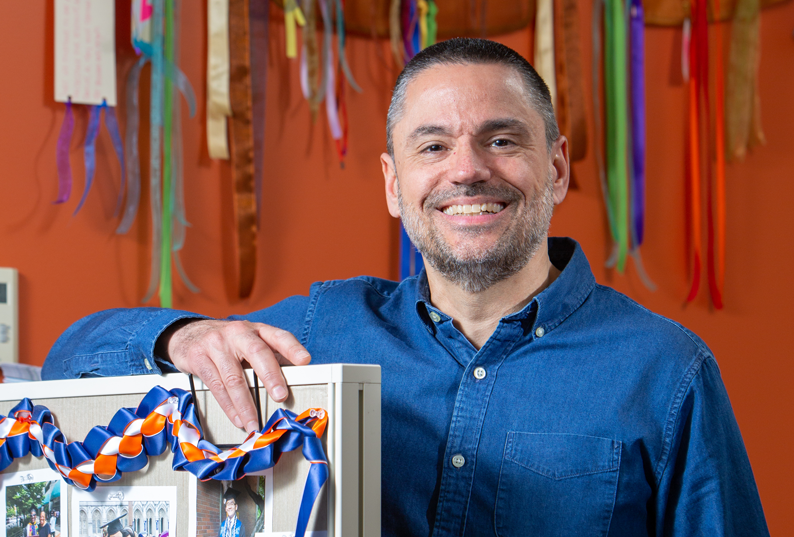Alumnus Finds Purpose in Guiding Youth toward Promising Futures
By Stacie Jones

For Fred Capestany ’86, serving others is more than a feel-good deed, it’s a basic living expense.
“I always had a sense from my parents that service is sort of the rent you pay for living,” Capestany said. “There was a strong belief that it’s just what you have to do, and that we all must do our part to help confront injustices and inequalities to help make the world a better place.”
This “rent for living” concept — attributed to the famous quote: “Service is the rent we pay for the privilege of living on this earth,” by Shirley Chisholm, the first black woman elected to the U.S. Congress — was instilled in Capestany and his seven brothers and sisters throughout their childhood in South Seattle. They watched their parents, both Cuban immigrants, stretch their limited income to house other Cuban refugees, serve in their church and travel around Washington state advocating for the rights of migrant workers.
“Even though my parents were poor, they always found a way to make a difference,” he said.
This deep-seated sense of social responsibility shaped who Capestany is today. The lifelong Seattle resident has dedicated his career to helping others, working mostly in higher education and for nonprofits that serve teens and young adults. As the director of college support at Rainier Scholars, a college-access organization, he guides low-income students of color toward top-tier college degrees.
“Most of the scholars are the first in their families to go to college; they don’t know what to expect or what’s required to get there,” he said. “We help them figure out their path and provide support to help them achieve their goals.”
His service extends far beyond his day job. He also works as a sexuality educator for Great Conversations, teaching the facts of life to preteen boys, and he supports the Seattle-based nonprofit organization Powerful Voices, a program that helps adolescent girls of color — often from low-income, troubled homes — find their voice and overcome injustices.
The missions of these organizations resonate for Capestany, who is dad to three teenagers (two daughters and a son).
Finding His Way
“The quality of my Whitman education was unparalleled, and the faculty were amazing,” said Capestany, who majored in psychology. “It was an experience I could not have gotten anywhere else.”
While grateful for his Whitman experience, he said it wasn’t always easy.
“When I first showed up at Whitman, I felt like a fish out of water. Even though I’m a light-skinned man and could have blended in as any other Whitman student, I felt completely different culturally as a poor, urban kid who grew up around cultural and economic diversity,” he said.
He considered transferring after his first semester. But instead, he got involved — really involved. He gave campus tours to new students, served as a resident advisor in Anderson Hall and coordinated campus activities for National Hispanic Heritage Month.
“I found my place and was doing something meaningful,” he said. “This sparked a desire to help people like me — students of color from low-income backgrounds — navigate their path and be successful.”
Today, he draws on his Whitman experience as he counsels Rainier Scholars who face similar struggles.
“A lot has improved over the years, but the reality is, the scholars are going to face challenges wherever they go,” he said. “I encourage them to not give up too quickly and to get involved. I tell them they might feel out of place culturally, but they deserve an excellent education just as much as anyone else.”
Connecting Whitties
Capestany continues to advance Whitman’s culture of diversity and inclusion as a founding member of the Whitman College Student Alumni of Color Association. The group hopes to increase involvement by connecting graduates directly with current students of color through reunion events and mentorship programs.
“There’s a rich network of alumni who want to help students and graduates be successful,” he said. “Our goal is to show current students of color they aren’t alone, and to provide ongoing support to Whitman alumni of color as they go out into the world.”
Capestany said the “rent for living” he’s invested has paid him and others back in numerous ways.
“Everybody needs meaning in their life. For me, that’s doing something that serves a larger purpose besides making money and having fun,” he said. “There’s a huge reward and pride that comes with making a difference in someone’s life. That’s something I started at Whitman, and it feels good to help this next generation of Whitties coming up.”
To get involved in the Whitman College Students & Alumni of Color Coalition, request to join the group on Facebook at “Whitman College Alumni of Color” or email fredcapestany@gmail.com.